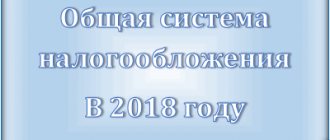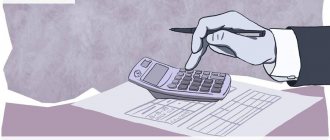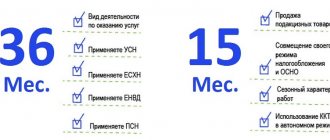Sometimes an accountant of an enterprise is faced with a situation where the expenses he has accepted for tax purposes are considered unreasonable from the point of view of the tax inspectorate. As a rule, this is due to the fact that tax inspectors always have up-to-date information from the Ministry of Finance of the Russian Federation at their disposal, and inspectors often resort to arbitration court decisions made not in favor of the legal entity.
This article collects the expenses that cause the greatest number of disputes between enterprises and the tax office.
The employee “selected” vacation days in advance
Sometimes situations arise when an employer provides an employee with vacation days that he has not yet earned, however, after taking his vacation, he resigns.
The organization has every right to withhold the resulting amount of debt upon final settlement with the employee. Some companies completely forgive such debts to those fired, which results in costs that, in the opinion of regulatory authorities, cannot be accepted for tax accounting.
Specialists from the Ministry of Finance regard such debts forgiven to a dismissed employee as gifts. And in accordance with Art. 270 of the Tax Code of the Russian Federation in the case of gratuitous transfer, such expenses cannot be taken into account when calculating income tax. This opinion is also enshrined in the letter of the Ministry of Finance of the Russian Federation dated February 26, 2020 No. 03-03/07/13686.
Deadlines for filing VAT returns for individual entrepreneurs in 2021
The tax period for VAT is quarterly. Therefore, an individual entrepreneur with VAT submits a quarterly declaration to the Federal Tax Service by the 25th day of the month following the reporting quarter. In 2021, the entrepreneur reports on VAT within the time limits specified in the table.
| Deadline | Taxable period |
| January 25, 2021 | IV quarter 2021 |
| April 26, 2021 | I quarter 2021 |
| July 26, 2021 | II quarter 2021 |
| October 25, 2021 | III quarter 2021 |
Recycling fee
Buyers who purchase a vehicle are not required to pay a recycling fee. Such a fee should be transferred only by manufacturers and importers of vehicles (Law of June 24, 1998 No. 89-FZ).
In reality, sellers often shift the responsibility to pay the fee onto the shoulders of buyers. This means that the latter reimburses the seller for the costs incurred.
As a result, the question arises: does the buyer have the right to write off the cost of the recycling fee as his expenses? The Ministry of Finance of the Russian Federation, in a letter dated August 14, 2021 No. 03-03-06/1/61449, believes that no, since the enterprise cannot take into account the expenses of other organizations .
There is also a controversial issue regarding VAT on the amount of the recycling fee that was charged to the buyer. The Ministry of Finance of the Russian Federation notes that value added tax must be calculated on the entire amount transferred by the buyer, including the recycling fee. In this regard, a letter dated March 30, 2021 No. 03-07-11/18544 was published.
General taxation system for individual entrepreneurs. How to switch to OSNO
OSNO is assigned immediately after registration of an individual entrepreneur, if no application has been submitted to switch to any other regime.
- simplified tax system on OSNO
To switch from the simplified system to the standard system, you must submit the appropriate application form for refusal to use the simplified tax system to the Federal Tax Service by January 15. If the application is not submitted, the transition will only be possible starting next year.
However, if the restrictions established for the simplified tax system were violated, the individual entrepreneur is “automatically” transferred to the OSNO in the quarter in which they were allowed.
- from UTII to OSNO
To transfer from imputation to the general system, an individual entrepreneur must, within 5 days from the date of termination of activities falling under UTII, submit to the Federal Tax Service an application in the UTII-4 form on paper.
But in case of loss of the right to use special mode, the translation is also carried out automatically.
- from Unified Agricultural Tax to OSNO
In this case, the application under f. 26.1-3 is submitted no later than January 15. The transfer is carried out automatically in case of loss of the right to use the Unified Agricultural Tax.
Payments to employees not provided for by the Labor Code of the Russian Federation
The Labor Code clearly defines situations in which the employer must pay a dismissed employee severance pay (Article 178 of the Labor Code of the Russian Federation). But sometimes there are situations when an organization, on its own initiative, makes payments of this kind , but which are not directly prescribed in the Labor Code of the Russian Federation.
The Ministry of Finance of the Russian Federation is loyal to this type of payments and allows them to be included in the expenses of the enterprise. The only condition is that such payments be specified in the employment or collective agreement. This position is reflected in letter dated June 19, 2014 No. 03-03-06/2/29308.
The tax authorities do not share the opinion of the Ministry of Finance, so quite often proceedings with legal entities end up in court. The courts, by the way, also take the position that it is unjustified to include such payments in expenses in order to reduce the base for calculating income tax (Resolution of the Arbitration Court of the North-Western District of February 18, 2021 No. A42-2473/2017).
Working with large clients
As we showed above, almost all relatively large companies or individual entrepreneurs are required to use OSNO. This means paying VAT. To optimize their taxes, such businesses try to choose suppliers and contractors who also work for OSNO. In this case, when purchasing a product or ordering a service, companies receive an invoice and can reduce their VAT.
Therefore, individual entrepreneurs who mainly work with large clients are often forced to adapt to them and become VAT payers, that is, voluntarily switch to OSNO. Otherwise, buyers may go to competitors.
Membership fees for specific purposes
Self-regulatory organizations (SROs) are created in various sectors of the economy, for example, in construction. Membership in an SRO involves the payment of regular contributions, at the expense of which such an organization functions. Membership fees of this kind are allowed to be taken into account as part of the organization’s expenses (clause 29, clause 1, article 264 of the Tax Code of the Russian Federation).
But membership in various unions or associations is voluntary and is not subject to inclusion in expenses in order to reduce taxable profit . On this occasion, a letter from the Ministry of Finance of the Russian Federation dated December 17, 2021 No. 03-03-06/3/98613 was published.
Tax savings on unprofitable activities
In most cases, special regimes help reduce the tax burden on businesses. However, in case of unprofitable activities, it is more profitable for an entrepreneur to use OSNO. The fact is that when applying the simplified tax system and special tax system, working at a loss does not allow you to be completely exempt from taxes.
- Under the simplified tax system “Income”, tax must be paid on the proceeds received, without taking into account expenses.
- Under the simplified tax system “Income minus expenses”, in the event of a loss, you still need to pay the minimum tax - 1% of income (clause 6 of Article 346.18 of the Tax Code of the Russian Federation).
- With PSN, the tax does not depend at all on business turnover. The cost of a patent must be calculated based on the type of activity and various physical indicators: number of employees, area of premises, etc. Therefore, the entrepreneur will have to pay for the patent for any results of activity, even if there is no revenue at all.
Therefore, if an individual entrepreneur assumes that he will have a loss, then it makes sense to temporarily switch to OSNO. This situation may arise, for example, during the initial period when starting a new business. However, it is important to remember that under OSNO, entrepreneurs pay two main taxes: personal income tax and VAT. A loss when calculating the first does not always mean that the individual entrepreneur will not have to pay the second.
The fact is that not all expenses that reduce the tax base for personal income tax simultaneously include VAT. For example, an individual entrepreneur pays salaries to employees and insurance premiums from them, buys goods or materials without VAT. All such expenses are taken into account when calculating personal income tax, but do not affect VAT.
Example.
The revenue of individual entrepreneurs at OSNO for the year is 12 million rubles, incl. VAT - 2 million rubles.
Expenses including VAT - 8.4 million rubles, incl. VAT – 1.4 million rubles.
Expenses excluding VAT—RUB 4.0 million. An entrepreneur does not need to pay personal income tax, because total expenses excluding VAT exceed revenue excluding VAT:
Revenue = 12.0 – 2.0 = 10.0 million rubles.
Expenses = 8.4 – 1.4 + 4.0 = 11.0 million rubles.
But the entrepreneur will pay VAT in the amount:
VAT = 2.0 – 1.4 = 0.6 million rubles.
Of course, VAT is an indirect tax that is financed by the buyer. But if the individual entrepreneur grants him a deferred payment, then he will pay his money to the budget. In addition, even if the ratio of income and expenses allows you to avoid paying VAT, you need to remember about tax risks. VAT returns in which deductions exceed accruals always attract close attention from tax authorities. In such situations, inspectors look for illegal tax evasion schemes. And since any individual entrepreneur is initially under suspicion from tax authorities and banks, as the most convenient legal form for illegal cash withdrawals, the risks are further amplified.
Therefore, when switching to OSNO in order not to pay taxes on losses, an entrepreneur must very carefully study all the arguments for and against such a decision. However, representatives of micro-businesses with revenues of up to 2 million rubles. per quarter, which do not trade in excisable goods (Article 145 of the Tax Code of the Russian Federation), have the right to be exempt from VAT and therefore most of the problems listed above will not affect them.
Employee leave abroad
The cost of expenses incurred by an organization to reimburse employees for travel to and from their vacation destination may reduce the tax base when calculating income tax. However, payment for tickets is allowed only when traveling within the Russian Federation . This follows from paragraph 7 of Art. 225 Tax Code of the Russian Federation.
If expenses for tax purposes include the costs of paying for tickets to travel abroad, the tax office will refuse to recognize them. This will lead to a recalculation of income tax and the accrual of penalties. In court proceedings, the decision is usually made in favor of the tax inspectorate. An example is an organization from Sakhalin, which lost in court in all instances, and even the Supreme Court of the Russian Federation sided with the Federal Tax Service.
OSN: definition of the concept
The general taxation system is an unofficial concept, despite its widespread use.
The Tax Code of the Russian Federation does not contain a direct correspondence for it. Moreover, in the main Russian tax law source there is no official interpretation of the term “general taxation system”. Therefore, for an individual entrepreneur, before thinking about the advantages and disadvantages of the special tax system, it will be useful to understand what is meant by the corresponding taxation system.
In accordance with the generally accepted definition, an individual entrepreneur is recognized as carrying out activities under the special tax regime if he does not apply any of the following special tax regimes:
- simplified tax system;
- Unified Agricultural Sciences;
- PSN.
A special case is the use by an entrepreneur of UTII. This special tax regime can be applied simultaneously with the SST, but for different types of activities (if, of course, among them there are those that are compatible with UTII in accordance with clause 2 of Article 346.26 of the Tax Code of the Russian Federation).
From 2021, UTII has been abolished throughout Russia. Find out what an entrepreneur should do if he combines UTII and OSNO in the Typical Situation from ConsultantPlus. If you do not have access to the K+ system, get a trial online access for free.
The application of the OSN presupposes the mandatory payment by individual entrepreneurs of the following basic taxes:
- VAT;
- personal income tax;
- property tax.
The main criterion for choosing one tax regime or another, both for individual entrepreneurs and legal entities, is the expected tax burden. What can it be like in AHF?
Income recovered in antimonopoly cases
When the antimonopoly service discovers traces of a deliberate offense in the actions of an organization, the proceeds obtained illegally are turned over to the state in court. Such violations include non-compliance with legal requirements during electronic trading within the framework of government orders, as well as income from activities in violation of the competition law.
In this case, the taxpayer does not have the right to reduce the tax base for calculating income tax by the amount of such losses. In accordance with Art. 270 of the Tax Code of the Russian Federation, penalties and penalties are not subject to reflection in the tax accounting of the organization.
OSN for individual entrepreneurs: tax burden for VAT
So, the first tax that an individual entrepreneur pays on the OSN is VAT. It must be transferred by the entrepreneur to the federal budget at the rates determined by Art. 164 of the Tax Code of the Russian Federation from each transaction reflecting payment by the counterparty for the delivered goods or services.
Find out about the current VAT rates in 2020-2021 here.
VAT, which must be paid to the budget by the individual entrepreneur on his own behalf, is called outgoing, since it is accrued on goods and services supplied by the individual entrepreneur to other persons.
There is also input VAT, which can be included in the cost of goods and services purchased by individual entrepreneurs or can be deducted. This VAT is paid on its own behalf not by the individual entrepreneur, but by his supplier, but only if he is also a legal VAT payer and can confirm this by issuing an invoice.
Russian tax legislation allows individual entrepreneurs to apply deductions for amounts paid as input VAT (if its supplier is itself a VAT payer and issues an invoice).
Example:
Jupiter LLC, which assembles televisions, purchased components for TV assembly from IP Stepanov A.V. in the amount of 120,000 rubles. including VAT 20%, which will be included in Jupiter LLC. Subsequently, the company, having assembled the televisions, sold them for the amount of 360,000 rubles, also taking into account VAT of 20%, which will be outgoing for Jupiter LLC and incoming for buyers of televisions.
As a result, Jupiter LLC received the right to accept input VAT amounting to 20,000 rubles for deduction in the presence of output VAT amounting to 60,000 rubles.








